#sanders sides analysis
Text
Let's do a quick analysis of this new short video "The Sides Need a Nice Day" which is clearly meant to be mostly for fun, but there's definitely some hints and easter eggs to pay attention to that I'd like to explore a little further.
I'll address this in three parts in separate posts, the first for Patton and Logan, the next for Virgil and Roman, and the last for Janus and Remus.
Let's start with the first part, about Patton and Logan.

Patton's initial approach, as we can see, was flawed despite his good intentions. He wants to do something nice for Logan, he thinks out ideas based on what he knows Logan enjoys, and he likes to see Logan actually having fun. These are all very emotion-based notions and motivations, which we can expect from Patton. He's inspired by his own emotions in response to seeing the videos online, and takes matters into his own hands to give Logan in particular a special day.
Why Logan? Because Patton's very in tune with emotions and can recognize that Logan has been having a tough time lately. He empathizes with this a lot (considering it's kind of his thing) so he wants to do something that he'd like someone to do for him if he was having a bad day - do something to cheer him up!
This is very sweet and he clearly puts a lot of thought into this idea...but it's not an immediate success because he only really puts the emotional concept and vision into it, and didn't think practically or make his decisions with logic in mind.
Wonder who could have helped with something like that...

First, he approached Logan about making a quick decision, which is not something Logan is ever known to do. Logan resists this right away by questioning him for clarification and is already annoyed to start because Patton is being vague and trying to get Logan to play along without giving consideration to Logan's need to understand a situation and weigh his options before deciding anything. Logan takes no action lightly and always thinks his actions through first, as opposed to Patton, who prefers gut instincts and impulsive action. He doesn't bother to offer Logan the information and time to make a more informed decision, all because he wants to hurry up and get to the fun part!
Patton (like Roman) is someone who is able to envision what he wants, but Logan is someone who actually figures out the steps needed to make that a reality. Without the steps, that vision is but a dream, and without the vision, the steps are just work with no purpose.
These sides need to learn to work together to accomplish goals, not just do things on their own, and this part of the episode gives us a hint towards that notion.
The peculiar way that Patton then explains the situation to Logan is also interesting, as he states that whichever option Logan chooses will be something Patton wants to do, and because Patton wants to do it, Thomas will want to do it, meaning Logan gets to do it, too.
This, by itself, is such an alarming concept to drop into this video, especially with Patton saying it so cheerfully.
In case it's not clear, Patton is implying that he has so much power and sway over Thomas' decision-making process that he can have Thomas do something just because he, Patton, wants to do it. None of the sides should have that level of influence over Thomas, but Patton not only has that power but also knows that he does.
(And to clear up any confusion, this is not the same as Janus saying during his part of the video that he's convinced Thomas to lean into certain thoughts for the day. Patton is suggesting that if he wants something, Thomas will do it, as if it's automatic and doesn't require convincing. That may be Patton oversimplifying it a bit, but it's still indicating his status above others in that sense.)
In this case, he's using it to give Logan a nice day by doing (read: permitting Thomas to do) things he knows Logan would enjoy...but in other context, that's a very dangerous situation, especially since Patton has been shown to make bad or skewed judgement calls in the past due to his biases as well as making some very impulsive, emotionally-driven decisions.
But he recognizes this status that he holds and is attempting to use it for good, so at least there's that?

The next and more obvious part of this section shows that Patton is rushing Logan through the activities chosen, talking over him or cutting him off when Logan questions Patton about this, and Logan grows more annoyed by this as time goes on.
He is not quick to anger, even when he was initially forced into deciding something with very little information, and it takes a few times of being pushed and talked over before he even shows his frustration at all.
It's important to notice this because Logan's anger is not just born of nothing. It's valid because it's a natural reaction to the situation he's in not being properly catered to him.
This is something we see in episodes of the series a lot, and when it comes to the specific moments where Logan has truly gotten angry enough to show it, it's never out of nowhere, even if it may seem that way. If you are properly paying attention, you will see the gradual buildup, where Logan keeps holding himself back, staying calm and collected as long as he can, before the emotion bursts out and he acts rashly (and then regrets it).

Logan's anger has been shown to appear after moments where he is repeatedly cut off, spoken over, and ignored or disregarded completely. Being silenced and skipped over so often, it's a wonder Logan keeps trying at all, but he does. At some point, the last line is crossed, and he explodes with that anger.
While the resulting behavior may be inappropriate or rude, the feelings motivating that behavior are extremely valid, because he's being pushed to this breaking point by others. Anger serves the purpose of making it known when someone's boundaries have been crossed and when they have been wronged, so it makes sense for Logan to experience it at these times.
So, in this short video, Patton is trying to do something nice for him, and Logan can recognize and appreciate Patton's intention, but the execution is filled with the same mannerisms that build Logan's anger - being cut off, spoken over, ignored. It's not that he doesn't enjoy these activities, either, but he's not being given the chance to enjoy them with the way Patton is presenting them to him. It's a recipe for disaster because Logan's needs and boundaries aren't being respected despite the whole point being to do something nice for him.
This is also a tough situation for someone to oppose, by the way! When someone does something nice for you but you honestly hate it, how do you begin to tell them that? You don't want to hurt their feelings because you know they were trying to be nice and meant no harm, but if you don't speak up about the issues you had with it, your boundaries could wind up violated over and over again and the other party would be none the wiser.
Logan must voice his frustration. He has to explain why he's upset. And, thankfully, in this section of the video, he does!
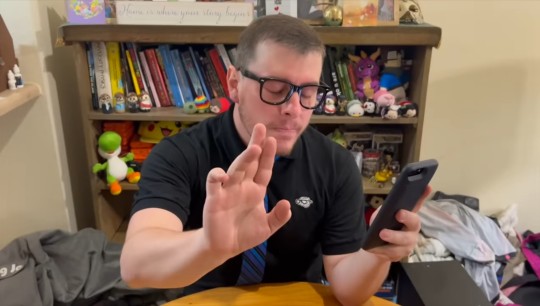
He starts by stopping Patton directly, hand out and everything. He speaks calmly and clearly, using the same tone he used when speaking to the others during DwIT to get them to chill out and not be so impulsive. Logan is using what he knows to work to make his case here, and he tells Patton that he appreciates what he's trying to do. But then, he raises his voice and informs Patton what's annoying him about it, that he can't enjoy these activities because he's being rushed through them. This is a direct communication of the issue at hand and why it's bothering him.
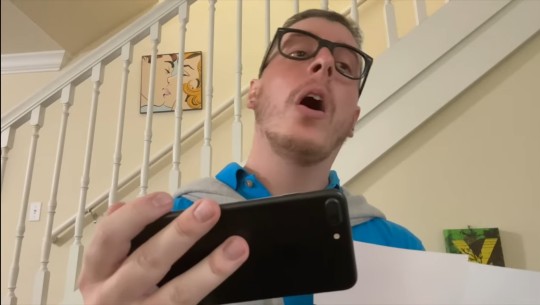
Patton then pauses, reflects, realizes his mistake and where he had messed up, and then alters his behavior to fix the issue.
It's so simple and succinct that Logan, while still annoyed, seems confused that Patton actually listened to him and by how easy it was to find that resolution.

And I think that's our next piece of foreshadowing, as well.
Logan has been holding back about his genuine anger and frustration over how he's treated by the other sides and Thomas. He feels ignored and only utilized as a tool, as if he were a book rather than a person (or the metaphysical manifestation of one, at least).
These are not feelings that have only sprung up recently, either - this has been happening for a very long time without Logan ever addressing it.
Until he does, the others won't realize the impact their words and actions truly have on him. He needs to speak up and the others need to listen and adjust accordingly.
With the way Patton responded in this part, though, perhaps this shows that they may have an easier, calmer solution in store than one might initially anticipate, but we shall see.

Speaking of foreshadowing, during the times Logan is shown in the library throughout this part, he is reading a book titled A Gentleman in Moscow by Amor Towles. Knowing past easter eggs and hints, it's likely this is not a coincidence.
Having read the book myself, I think it's very possible this is a potential nod to something that may occur soon within Logan's upcoming arc (whenever that may happen), as the book happens to deal a lot with the concept of imprisonment and finding ways to live through adversity.
In the book, the main character is put on house arrest in a bustling hotel in the city, but he's relegated to a cramped attic space and had left all of his books away from home so he cannot access them, because if he dares to leave the hotel, he'll be shot dead. So he stays inside, and he self-reflects because he now has a lot of time to think. He gets to know the people who work and live in the hotel, how their lives are so different than his own had been and continues to be. For quite some time, he feels the true punishment of his stay there, how the whole world outside is moving on so fast, but he is stuck inside, removed from it. He becomes effectively useless, unable to be or do anything for others (outside of giving amazing wine pairings for meals, of course), but he stays true to himself despite it all. He remains his charming and intelligent self, he makes new friends, he finds ways to be happy despite being trapped there.
The most popular quote from the book is one that says, "if a man does not master his circumstances then he is bound to be mastered by them." And while the main character in that story manages to make the best of his life and circumstances, we know that Logan is still struggling with his fate right now, being trapped within Thomas' mind as someone who cannot fully explore his own interests, who has less and less purpose since Thomas left college, and feels less respected and listened to every day.
Logan has to find a way to obtain happiness despite his circumstances, because he can't change his situation, but he can change how he responds to it.
This book may be a clue as to how he finally figures out how to do that.
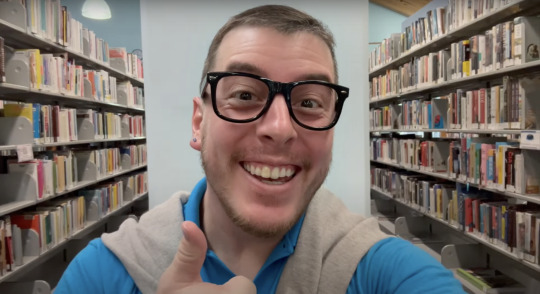
The outcome of this part of the video with Logan and Patton is a satisfying one. Logan expressed his frustration, Patton listened and was able to correct the issue, and Logan was able to have a nice day after all, which is what Patton had set out to accomplish. There were quite a few bumps along the way, but it was successful in the end!
Now, onto the next part...
#sanders sides#sanders sides analysis#patton sanders#logan sanders#ts spoilers#long post#orbs thought bubbles#I'm posting part one for now and I'll post part two and three later on because i have two jobs back to back today and tomorrow so I'm busy#pfft but i won't make anyone wait for too long i promise
324 notes
·
View notes
Text
Thinking a lot about the significance of Patton representing both c!Thomas’s feelings and his morality. Because it’s been made very clear that c!Thomas’s way of dividing the facets of himself cannot be universally applied to everyone, and the thing is that one’s morality being based on their emotions is very much not the case for everyone. There’s a reason ethos and pathos are two separate appeals in the rhetorical triangle, yet in Sanders Sides the pathos guy also represent c!Thomas’s ethics.
Think about it; every Side has their own unique moral code based on what they represent. The fact that they all have different viewpoints on what they believe is the best thing to do is the reason they have arguments like SvS in the first place. But despite this, Patton is the only side who actually represents Thomas’s morality. Roman and Logan both personally believe it is best for Thomas to go to the callback but encourage him to go to the wedding anyway because that’s what Patton believes is the right thing to do, and therefore that’s also what c!Thomas believes is the right thing to do. One’s ethics could just as feasibly be based in logical reasoning (what is the best course of action based on facts, statistics, and probability?) or self-preservation (what is the best course of action to fulfill my needs and desires?) or even idealism. But Thomas’s are based on his feelings. See a cute dog? Adopt it, the poor thing needs a home. Friends need help with something? Oh, you love your friends, they’re so wonderful! They deserve everything you could possibly offer them. Homelessness is sad, volunteer at your local soup kitchen. Violence is disturbing, shut it down!! It doesn’t matter if what you’re doing isn’t logically sound, or if it’s creatively unfulfilling, or if it serves to your own personal detriment; You should do what feels right. And considering natural law is the basis of Catholic moral theology, it makes perfect sense for him to associate his morals with an intrinsic part of him like his emotions rather than a conscious thought process. Plenty of us do not subscribe to natural law theory, however, and if I were making my own Sides I very much would not have my morality Side and emotions Side be one and the same.
But it’s not just Patton, is it? Roman represents Thomas’s hopes, dreams, and passions because most of Thomas's passions, career, and hobbies are creatively focused. But every Side also has their own motivations. Their own passions. Their own reasoning skills. Their own fears. Their own anger. Yet not all of them represent Thomas’s passions. Thomas’s reasoning. Thomas’s fears. Thomas’s anger. What would happen if Thomas’s passions were more aligned with Logan’s role? If his ethics were more aligned with Janus’s role? If his punctuality was more aligned with Virgil’s role?
And what would it look like if c!Thomas’s anger was somehow most aligned with Logan’s role?
#didnt feel like typing c!Thomas every time but like. I’m exclusively talking abt the character here#sanders sides#sanders sides analysis#meta analysis#virgil sanders#logan sanders#orange side#roman sanders#janus sanders#remus sanders#patton sanders
86 notes
·
View notes
Text
expanding on one of my previous posts, i really don't get it when fanders want to paint a certain side as "evil" or "toxic" and that certain side is always Patton
these are NOT individuals who think and make decisions for themselves. they are parts of a whole. each of them have a core quality, even if they tend to show other emotions sometimes.
Logan is not apathetic, he's literally the embodiment of logic, which is why he is so detached from anything fantastical or involving emotions. he did get better at dealing with emotions by coming up with logical solutions to it, but I don't think he will ever be able to understand or relate to emotions on the same level as Patton.
Roman isn't egotistic, he is the ego. he is the embodiment of Thomas's creativity and ego, meaning that it is completely natural for him to focus on himself too much or find it difficult to consider things from another side's perspective.
Patton is not unsympathetic, he is not toxic. I've even seen some people call him abusive?? he is a part of Thomas and unless one can abuse oneself, Patton is not abusive. Patton is the product of Thomas's upbringing, he cannot help being strict with his morals any more than Thomas can go back to his past and unlearn this unhealthy mindset. it's Patton's job to keep Thomas accountable for any mistakes he makes, and what these "mistakes" are depends heavily on what Thomas was taught.
something Virgil said in one of their earlier episodes is worth noting.
"You don't want me here but I am here, and this is what I do."
this applies to all of the sides. they don't choose to do what they do, Thomas does. if Patton is "guilt-tripping" Thomas or Roman about something, that's just Thomas naturally feeling guilty about said thing. if Virgil is trying to scare Thomas, that's just Thomas being anxious.
i know it sounds a bit like i'm not suspending my disbelief, but this is actually what happens in canon. just because the sides have physical forms and act like real people doesn't mean they are. and regardless of how much they change and grow, they will always have those core characteristics that define who they are.
#logan sanders#patton sanders#remus sanders#remus tss#roman sanders#sanders sides#sasi#thomas sanders#tss#virgil sanders#ts janus#janus sanders#ss#ts sides#sanders sides analysis#analysis#ts patton#patton#logan#virgil#remus#roman#janus#orange
202 notes
·
View notes
Text
So I heard it’s Mother’s Day in the US, so in honour of that, here’s a very late and mildly unhinged analysis of what roles in the family the Sides claim in the 5th Anniversary video
Patton - “I’m the dad”
In the ‘traditional nuclear family’ (ew) the father is typically seen as the head of the household, the breadwinner, the one with authority. This reflects how Patton has always had a position of authority among the core sides, with Thomas often putting his say first and relying very heavily on his opinion. However, much like how the idea of the father being the head of the household is outdated and problematic, so is the position of authority Patton is put in, which we’ve already begun to see. It’s time Thomas puts less pressure on Patton. Maybe even go to the ‘other half’ of the couple…
Logan - “Why am I the mom? What gender roles are we pushing here?”
Most notably, he is the only one who does not choose his role in the family. Patton is the one to assign Logan the role of mom, while Logan’s own feelings and thoughts on the matter are ignored. This reflects the issues he’s been dealing with throughout recent episodes, being ignored and overlooked. The fact he is in the mom role furthers this, with again, in the ‘traditional nuclear family’ (ew) the mother’s work and suffering often being overlooked, because she is simply doing ‘what is expected’ of her.
Roman - “I’m the son, the hotshot, who’s only dream… is to be a star”
Being “the son” of among the ‘Light’ sides potentially links to Roman’s feelings of inferiority, believing he has less power in Thomas’ life compared to Patton and Logan - not surprising after POF. And his sad tone when talking about his dreams links to his feelings of being failure, both with the whole callback debacle and Thomas literally becoming a star, and just generally in his desire to be seen as Thomas’ hero.
Virgil - “I know you think I’m the son, but I’m not. I’ll be the gay emo cousin.”
Virgil immediately starts by separating himself from the rest of the core four, placing himself outside of the immediate family. This links to both his current strain against Patton, but also his insecurities after revealing himself as having once been a ‘Dark Side’. He no longer feels like he belongs with the ‘Light’ Sides, as was affirmed in the first episode of season 2. Rather, he puts himself in the immediate family of the other ‘Dark Sides’.
Remus - “I feel like I’m a fresh out of jail uncle.”
“Fresh out jail” equals new to the group. No one knows much about him or what exactly his deal is, since he hasn’t been around long. However, what they do know is he’s come from “jail” - aka, was repressed for being bad creativity. Therefore, they instantly have a negative bias against him and assume the worst.
Janus - “And I’m the sassy aunt. Who talks shit about everyone…”
Despite being ‘accepted’ by Thomas and opening up about his name at the end of POF, he still positions himself with the ‘Dark Sides’ and not the ‘Light’ ones. This could mean two things:
1) He has still not fully been accepted by Thomas,
Or 2) He doesn’t personally see himself as ‘with them’. Whether because he knows full well the ‘Light and Dark’ dichotomy is meaningless, or because he doesn’t trust them back, or because not all of the ‘Light’ sides accept him yet, we don’t know.
Him “talking shit about everyone” is also notable. He is the one who can see the problems among the core four, viewing them from the outside. He knows their weaknesses, struggles and issues - and he is going to make them apparent, so that they and Thomas can finally deal with them.
Thank you for coming to my TEDTalk.
#sanders sides#thomas sanders#logan sanders#patton sanders#remus sanders#roman sanders#virgil sanders#sanders sides analysis#sanders sides theory
337 notes
·
View notes
Note
cant send this on anon. sad! anyways i think the point of pattons arc is to accept that the others have importance. learning to not bottle up his feelings was the first step to fixing a larger issue about himself, that being that he tries to put all responsibility of himself. and that manifests in a lot of ways, including not respecting the others and their roles.
but then you get to the end of pof, and after janus resigns to being wrong about everything, patton says that they both know that's not true. that to me signifies that something shifted in him after pof. thats him directly recognizing that janus was right. that selfishness was the right choice, that janus is important. and this is a direct consequence of janus pointing out his flaws to him (when he turns back into a human he admits that he doesn't know what hes doing and he cant pretend that he does anymore. which is a direct response to when he resolves to make sure thomas isnt a bad person in svs)
does that mean he's good at it? no. not at all. but i do think hes trying. given that hes already had a major breakdown in a video i cant see the same happening for the finale but he should definitely take time to acknowledge the others roles. maybe he can talk logan/orange down and tell him that the rage he feels is justified and important to thomas? something like that. i would love it if remus got a chance to be involved but i have the bad feeling hes gonna be the designated one dimensional comedic relief. which i kinda get why but also come the fuck on. anyways thats my two cents idk
i completely agree with you homie!!!
i also appreciate the nuance in this take cuz so many people fly to my askbox and try to tell me that patton is some innocent baby and that he should never be criticized ever because "he's trying!" and that's not what you did you actually spoke like with intelligence which was so fucking awesome to read. /g
i absolutely agree with everything you said. this is patton's arc. his arc isn't "i'm too nice and i need to stop being too nice" HELL NO that's not his arc whatsoever and there is no indication of that being his arc even though people constantly pretend that's his arc. NO. his arc is that he needs to learn that he is not the end-all-be-all of thomas' mind, and that he is not always the most important voice in the conversation. though he doesn't have overstated hubris, how highly he thinks of himself and how lowly he thinks of the others is blatantly obvious through his actions, and he's slowly getting better at, like, NOT doing that and it's really good change to see! he still has a...long...long...LONG way to go, but at least he's going somewhere. i just wish people would acknowledge this super interesting journey instead of watering patton down and being super fucking annoying whenever i try to critique him the tiniest bit.
#thomas sanders#sanders sides#tss#roman sanders#sanders sides fandom#virgil sanders#patton sanders#logan sanders#remus sanders#janus sanders#sanders sides analysis#sanders sides fandom critical#tss fandom crit
26 notes
·
View notes
Text
Sanders Sides and autism
Ok, it's the last day of @autisticsidesweek today, and I figured this would be the perfect time to post this essay about how I think Sanders Sides relates to autism.
Headcanons about the Sides being autistic are pretty commonplace, which isn't surprising given how many autistic people there are in the fandom, and in fandoms in general, for that matter. As an autistic fander, I am of course partial to these headcanons. But that's not exactly what I want to address today.
Today, I want to talk about how the concept of Sanders Sides naturally lends itself to having autistic-coded characters, and how this coding is actually a fundamental part of the show.
Before I start, I think it's relevant to mention that Thomas has ADHD. This has a lot of symptoms in common with autism, and is probably a big reason why some of the Sides resonate so strongly with autistic people. However, I think there are other aspects of their characterisation that also make them unintentionally autistic-coded.
First of all, the characters have very clearly defined personality traits and interests. While autism can lead to someone having an unclear sense of self, it does come with a need to sort things into categories. An autistic person might define themself by specific traits, such as being creative or logical.
Additionally, the Sides' interests often seem like special interests - that is, an interest that feels more important than a regular interest, and I speak from experience when I say a special interest can consume every waking thought and make it impossible to think about anything else. This is most obvious with Virgil, whose interest in emo subculture and music informs not only his taste in music but his dress sense, and his personality. But this is also true of the other sides - Roman is not actually a prince, but he dresses as Prince Charming and always tries to act like a prince, Patton tries to fit the role of a dad, and Logan a teacher. All of them base their personalities and styles around one specific interest or trait, the way an autistic person might do with a subject they're interested in.
Even the fact that they wear the same clothes all the time ties in with this. Autistic people very often have comfort items, including clothing which they want to wear every day. From a meta perspective, their costumes obviously stay the same to make characters played by the same person more distinct, and because of wardrobe budget. But in-universe, these are characters who have the ability to shapeshift into whatever they want, and wear whatever they want, yet they always choose to stick to the same outfits.
Secondly, the characters in Sanders Sides have difficulty seeing things from anyone else's point if view. This is an integral part of the series, and many of the plots revolve around the Sides struggling to understand each other’s perspectives. Logan and Roman notably get into a lot of arguments as a result of not understanding each others perspectives. Low empathy or varying empathy levels in different areas can be a trait of autism, which is part of the reason autistic people find it hard to relate to others, and I think this is present in Sanders Sides.
I've already mentioned how autistic people often group things into categories. This can also come across in a very black-and-white way of thinking about things. From personal experience, I'd describe this as only seeing things one way or another - for example, finding it difficult to compromise, or accept that people can do both good and bad things without being sorted into the categories of Good and Bad. This isn't the case for all autistic people, but both of these examples are particularly relevant to Sanders Sides. The whole idea of the light side/dark side dichotomy is a pretty straightforward example of this kind of thinking.
Patton in particular has a very black-and-white way of thinking about morality, and inability to see things from a perspective other than his own. Another thing linked to autism is a strong sense of justice - or at least, a strong sense of perceived justice. This means that autistic people tend to cling to the morals they've been taught, (whether that is because of the black-and-white thinking, or finding comfort in clearly defined rules in a world where little else seems to make sense, or a combination of the two). This is exactly what Patton does. He also struggles to see how the moral standards he's been taught could possibly be wrong.
It would be remiss of me to write an essay about autism-coding in Sanders Sides and not dedicate a section to Logan specifically.
Logan has a lot of more well-known autistic traits. He likes schedules and punctuality, meeting deadlines and making sure all of his time is planned. A lot of autistic people struggle to function without a rigid schedule and don't like changes to plans.
He also has a tendency to take things literally. This is shown by his panicked reaction of "who gave him a knife?" to Virgil’s "can I take a stab?". He always clarifies when he means something figuratively, because he would need the clarification if someone was talking to him. Idioms and slang phrases don't come naturally to him, so he uses note cards to help himself remember them.
He's very single-minded and struggles to see things from other's perspectives. Although he makes a clear effort to try, it does take conscious effort that it probably wouldn't take an allistic person. When discussing schedules with Roman, he doesn't see anything wrong with only leaving 5 minutes for creativity, because that's not his domain.
Difficulty connecting to or identifying one's own emotions can also be a trait of autism. Logan states frequently that he doesn't have emotions, or doesn't feel anything. That is honestly what autism can feel like sometimes. Even if the emotions are there, it can be really difficult to tell the difference between sadness and anger, feeling tired or frustrated or just hungry. This reminds me of Logan because even though he's clearly been angry and excited and scared on screen, he still insists that he doesn't feel those emotions.
This is all to say, I think the fact that the sides base their lives on specific interests, generally have difficulty empathising with each other, and other aspects of their characterisation make them unintentionally autistic-coded. This format of show especially lends itself to that because of the characters personifying abstract concepts and having very distinct designs.
#sanders sides#virgil sanders#logan sanders#roman sanders#patton sanders#the dark sides aren't rlly mentioned that much so i won't tag them#sanders sides analysis#autisticsidesweek2023#i could maybe elaborate or word things better in future. im tired but i wanted to get this out today
42 notes
·
View notes
Text
there’s been a lot of discussion about logan and roman during the recent sanders sides episodes and for good reason. the two of them have been through so much, with The Sides Need a Nice Day showcasing that they really do deserve break after all the angst.
however, one character that’s also been facing heavy struggles throughout this time is patton. despite being the side that gets listened to most often by thomas, he hasn’t had the most optimal experiences in a while either, especially since the inclusion of janus and remus into the narrative and the events of selfishness vs selflessness.
this post will focus primarily on the events of Dealing with Intrusive Thoughts but will contain references to all the other episodes throughout.
a little background on patton shows us that he is who thomas tends to refer to in order to receive advice on how to be a good person. being the embodiment of morality, patton does seem to hold a standard for the concepts of “good” and “bad”. it’s a very rigid standard and if something doesn’t match accordingly, patton gets uncomfortable and tries to change it.
an obvious example of this would be patton’s reaction to remus in dwit. in a simplified, black and white sense, intrusive thoughts are bad. they’re harmful and the content of these thoughts is negative and unwanted so it makes sense that patton would want to relinquish remus’ hold on thomas immediately.
as a result, patton is also afraid of remus. during his introductory song, remus states that good and bad is “all made up nonsense” because even though he seems to be the “bad” creativity to roman’s “good” creativity, the line that separates both brothers isn’t as fine as it looks.
logan attempts to explain to thomas that life isn’t black and white and the contrast between roman and remus only appears because that’s how thomas visualises them in his mind. to thomas, roman is good because he encompasses the pleasant part of creativity, the part that’s socially acceptable.
on the other hand, remus is what thomas wants to avoid at all costs. therefore remus becomes bad. in the moments before logan’s explanation, patton insists that imagination is good and stresses that roman is creativity, not remus. he’s insistent on driving remus out of the conversation and away from thomas.
patton’s biggest fear is that thomas is a bad person and that he hasn’t accomplished his goal in trying to make thomas the good person he believes him to be. janus’ influence on thomas proved that thomas wasn’t naturally just good, and it created doubt in patton’s mind that was otherwise not there. he assumed thomas was, by all standards, a good person, and having that illusion shatter in front of him has him questioning not only thomas, but also his own actions.

now with the arrival of remus and thomas thinking unpleasant thoughts, that fear has reawakened. at the end of svs, patton did end up getting what he wanted: that thomas go to lee and mary lee’s wedding. he believed it was the best course of action and the most morally good course of action.
in fact, during this episode, logan reveals to everyone that it’s not remus who’s been hurting thomas and disrupting his schedules, but virgil and patton instead.
when patton disagrees with comparing thomas to jeffrey dahmer, he also refuses to set the bar at whether or not thomas has murdered someone, like jeffery dahmer had. but logan points out that patton, of all sides, should know that isn’t where the bar is.

as he goes onto explain, thomas’ upbringing has instilled a strong moral code in him as well as christian values. this explains why morality plays such a huge factor in thomas’ decision making and why he’s so reliant on patton to make his decisions. thomas thinks with his heart, not his head, to make the decisions that are best based on what’s good or bad rather than what’s efficient or rational.
in svs redux, when thomas laments on the fact that he could have just spoken to his friends about skipping their wedding to go to the callback instead, patton is still severely against that thought. skipping the wedding would logically have been the better decision for thomas- he might not get this opportunity again, and as logan mentioned, the wedding only offers thomas a potential spike in depression.
which it did. the only thing thomas got out of the whole situation was a new highscore in word crush and a sense of guilt and regret over everything that happened. not exactly the most ideal rewards for the sacrifice that he made to get there.
however patton tried to convince him that going to the wedding despite all the problems was a good idea because thomas was able to support his friends! it may not have been the rational choice but it was the good choice, the selfless choice. in patton’s world, altruism is purely good and selfishness is purely bad.
that’s why all the examples he gave in svs redux were curated so that thomas would have to make the altruistic choice or risk being a bad person.
now, patton isn’t in this for manipulative means. he is genuinely trying to help thomas given what he knows of situations. thomas’ dependence on him throughout the series has developed him into being an all knowing father figure, who needs to choose the right option so that thomas can do what he needs to without being a bad person. thomas fears being bad, which is why he hides away everything that makes him bad.
while i’m not qualified to talk about christianity or its religious teachings (as i’m not christian), it is interesting to note that patton being the father almost makes him the quintessential god figure.
the father, who thomas must listen to, who knows right from wrong, who decides whether thomas is a good or bad person based on his actions, and the one who can punish him for making the wrong choice. janus is the snake come to trick thomas into sinning, and remus is another dark side whose authority would cause thomas to act and think in ways that are considered wrong.
it’s not unlikely to assume that the reason that thomas’ creativity split in the first place was because morality dictated that there were pleasant and unpleasant thoughts and the distasteful thoughts were repressed and cast aside out of fear that thomas would be punished for having those thoughts.
even though patton didn’t intend it as punishment, him berating thomas all night and trying to force intrusive thoughts out of his mind was chastising. at the end of the episode, patton even stated that thomas had his “permission” to think those thoughts and thomas admitted that it did help to know that.
thomas needed permission from his moral side to be allowed to have intrusive thoughts. because up until then, patton didn’t realise that they were normal and okay to have. he was afraid that they made thomas an evil person simply because they were evil thoughts.
blaming patton for overreacting wouldn’t be right either, because ever since the first sanders sides video he’s been making a genuine effort to help thomas. he is misguided and rigid in his values but he isn’t malicious or deceptive. when logan said that virgil was the one who caused thomas to stay up all night, it didn’t surprise either patton or remus, given that virgil was anxiety and his reaction made sense.
but when logan said that it was also patton, remus seemed to be genuinely surprised and patton turned to look at logan with a stunned expression.

he couldn’t believe that he was the one who had been making thomas feel bad about himself, and moreover he hadn’t been listening to thomas when thomas insisted time and again that he didn’t like having these thoughts and that he wasn’t enticed by what remus was saying. this is patton realising that despite his best efforts, he was ultimately causing thomas to have persistent difficulties grappling with who he was and why he felt like he couldn’t be a good person.
in patton’s constant struggle to prove thomas’s goodness, he put thomas up on a pedestal that was impossible to escape because it required him to be as altruistic as patton assumed was the norm for a good person, even if that goal was unreasonable or for some reason unattainable.
our lord of the lies said it himself when he berated patton for misleading thomas.

as janus put it, patton wasn’t capable of misleading thomas. his intentions were sincere and he wanted to help thomas the way that he’s always helped him. but morality isn’t the same for adults as it is for children. when thomas was a child, things were easier. kids are more easily swayed by the effects of good and bad than adults are, simply because ethics for a child aren’t as nuanced as they can be for adults.
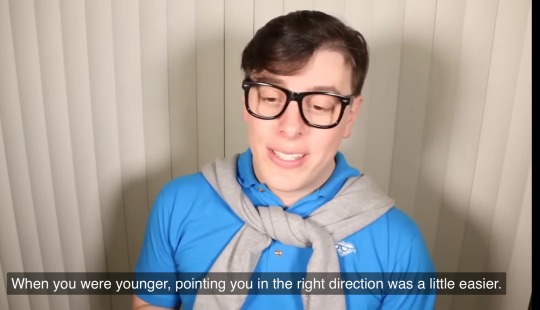
thomas depended on patton because according to him, patton has never steered him in the wrong direction and so he’s certain that for every decision, if he consults patton, he can end up making the right choice. that has worked for most of his life because as a kid, he made simple choices. ones that didn’t involve the level of critical thought that they now do.
so in trying to be that rock for thomas, patton has given himself the power to know and decide what he thinks is best by weighing the options as good or bad. it’s a terrible scale, but the only one he knows. so when thomas starts to listen more to suggestions from janus or roman where he might end up doing the wrong thing— such as lying to his friends about why he’s skipping the wedding— patton immediately puts his foot down. he won’t let thomas do that.
this isn’t helpful. while there is effort, it’s clear that this approach has been hurting thomas more than helping him. patton keeps trying to do the right thing but that’s only possible if thomas’ mental health is balanced but with everything that’s happened, thomas is hanging on by a thread and patton can’t see that.
the plane is already crashing. now is the time to take a step back and focus on himself.
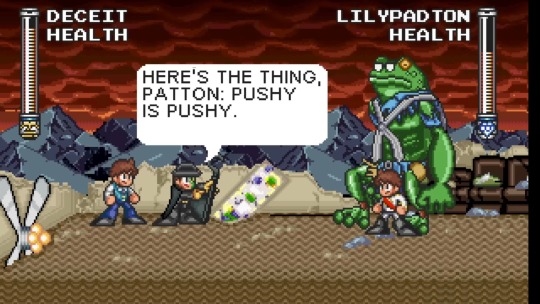
even patton ended up having a crisis over what to do, which caused him to become lilypadton. he thought he had everything figured out. he thought he had all the answers. but he doesn’t. and this strikes him during a moment when logan (janus in disguise, but patton doesn’t know that) tells him that he’s forcing thomas to risk his own life and health for other people.
suddenly, patton doesn’t know what’s right. he just knows what he wants to be right. and thomas, who has depended on him all his life, is looking to him for help but he doesn’t trust patton as much as he used to anymore and patton lost his chance to make up for his knee jerk reactions in svs and dwit.
he crumbles under that pressure. he’s really pushing to make things right, and his principles conflict with that. like thomas, who in dwit couldn’t accept that he was having intrusive thoughts because his own principles stated that having these thoughts was bad, patton too wants to make everything better but he isn’t able to do that because there’s a disconnect between what he thinks is right and what is actually helpful to thomas.
patton looks to janus for help, because now it’s janus who’s giving the advice. thomas is listening to him. the plane crash was patton’s fault, but janus has pulled thomas out of the rubble.


he thinks he’s bad for thomas. he has tried his best to help, but none of it has worked. in the end, he was part of the problem. he apologised to thomas in svs for being dishonest, he apologised in dwit for his reactions and he has to apologise again in svs redux for lashing out and being too pushy. how many times can he say sorry before it loses meaning? how many times can he say sorry before he admits to himself that he’s just bad for thomas?
hopefully patton can figure out a balance between knowing what is right and helping thomas figure out what is best for him before the orange side is revealed to us, because as @rataticaisdreaming pointed out in one of my previous posts, if patton continues to disapprove of what he thinks is wrong, it might cause a remus 2.0 situation. especially if orange has influence over logan, and patton makes logan feel guilt over it.
overall, i do think patton has been making a steady improvement. his attempt to reconnect with logan and help him is sweet, and he really does fix his mistake when he figures out that he’s been rushing and needs to chill out. this isn’t the first time logan has told patton to chill. but it is the first that patton has listened to him and actively slowed down.
i have hope for patton. i always will.

#sanders sides#rambling prince thoughts#patton sanders#patton angst#sanders sides analysis#patton might have been a little too much#but he’s getting to a better place#and i am proud of him#hopefully now things can work out a little better#i love his little ‘i did it!’ at the end of his scenes with logan#truly shows that patton is trying#we love him for it <3
55 notes
·
View notes
Text
Ranting About Sanders Sides Again Because I Can
The fact that Roman and Virgil are currently the two sides with the most stable relationship out of the whole cast right now is just, so sweet to me.
Technically you could make a case for Janus and Remus's relationship or Janus and Patton's relationship, but Janus and Remus haven't actually interacted in a canon episode just yet, and Janus and Patton's relationship is just really getting started, so I'm not counting either of those just yet.
Now, Roman and Virgil. We know them, we love them, and I think all of us know that their relationship initially started off pretty rocky. For pretty much all of Season 1 they didn't exactly get along at all. But since then, they've gotten to the point where they're genuinely really good friends, (I'd personally even call them best friends!) and they've still got their usual banter, but at this point it's become their thing. They're not really Roman and Virgil without it!
The fact that Roman's become so much more closed off towards everyone else, but is still happily bantering with Virgil really just goes to show how much he trusts him. And it makes sense! Virgil's proven to him that he actually cares about him (see FWSA for reference) and in turn that's caused Roman to become much more comfortable around him! I mean, just look at how Roman talks about him in the 5th Anniversary Episode compared to when he's talking about the others!!

"patton"
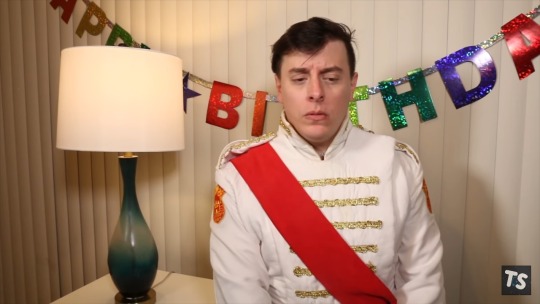
"logan"
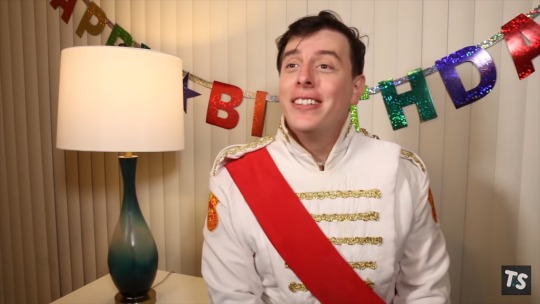
"virgil"
See the difference? I certainly do!
Whether you consider their relationship to be currently the most stable in the series right now or not, you have to admit that Roman's relationship with Virgil is most definitely his own most stable one out of everyone right now. Including Thomas!
Honestly, if we don't get to see Roman and Virgil being freaking best friends in the season finale, you will not hear the end of it from me. There will be many a grumpy rant coming from my end.
I'm very excited to see how their relationship develops from here, both with how they're gonna be responding to Janus's acceptance, and with their interactions with just each other on their own. It'll be nice! And I'm very excited to see how it all plays out! :)
Also the Sanders Sides season finale cannot come soon enough, I am absolutely craving more content and I cannot wait to see what happens next.
Alright! That's all from me for now! See you all again soon!! 👋
#if we don't get roman's issues being addressed and roman and virgil being besties in the season finale i will riot#also i cannot wait to get more Roman angst in the upcoming episodes#it's gonna be great#sanders sides#ts sanders sides#roman sanders#virgil sanders#roman angst#roman sanders angst#prinxiety#sanders sides rant#rambles from yours truly#sanders sides season finale#ts prinxiety#ts roman#ts virgil#sanders sides analysis
169 notes
·
View notes
Text
The Importance of Wardrobe in Sanders Sides
Sanders Sides is a great show, discussing how deep the characters are even as just facets of one person’s personality. One way this is done is by use of wardrobe.
Let’s look at the basic gist of the characters, in order of their first appearance. At first, C!Thomas. He doesn’t really use wardrobe to express his own character. Mainly he just wears whatever shirt is at the top of his laundry pile. This does change later, but we’ll get into that.
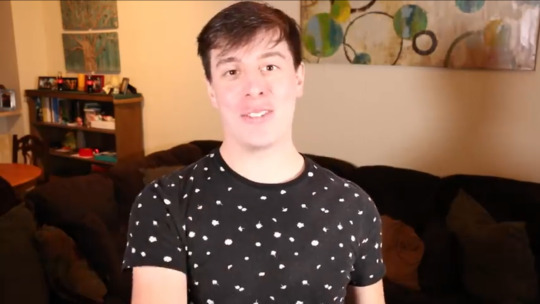
Logan is the first side to appear. He wears a black shirt and a blue tie, along with square glasses. He is the teacher character from Thomas’s vines, and dresses as such. This is because he represents logic, as clear as it is.

Next to appear is Roman. He wears Thomas’s slightly messy prince outfit, also from vines. Out of all of Thomas’s vine characters, the Prince is one of the most creative ideas, including several original lyrics to parody Disney songs, so it only makes sense.
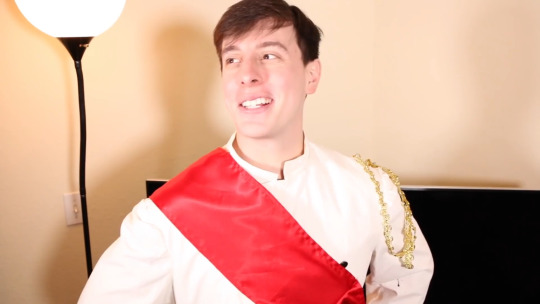
Then Patton appears. As the dad character from Thomas’s vines, he has a cardigan tied around his neck, a blue shirt, and glasses.

Virgil takes a bit longer to show up, but when he does he has slight black eyeshadow and a thrifted black hoodie. He is the only one to have his hair styled different from the others until Remus, having messy bangs going over his eyes rather than slicked to the side like the rest of the Light Sides. He played a villain character against Prince in a few vines, reminiscent of his villain arc for the first season.
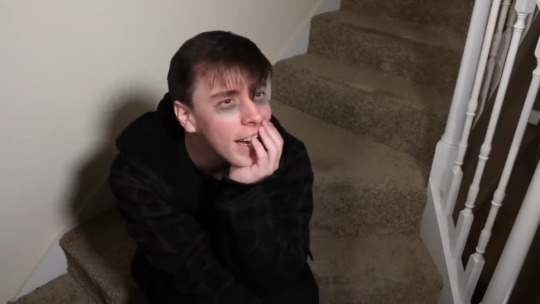
What’s really interesting is the eyeshadow. In Accepting Anxiety 2/2, each Side progressively wears darker black eyeshadow. This shows that this is only a trait of Virgil and his room. (Tumblr is already lagging because of how long this is getting, so I’m only putting an image of Roman here.)
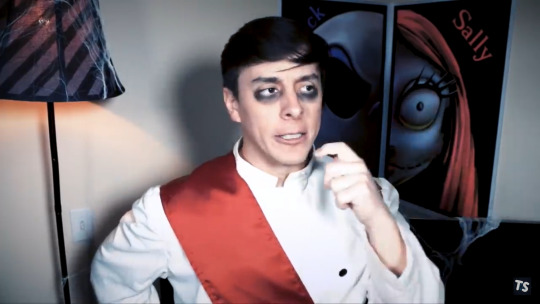
From this point on, Virgil’s eyeshadow is much darker. Then the costume change happens, at the beginning of s2.
Roman is the first to change, now wearing a more put together costume. His emblem is a shield and castle, representing his need to defend Thomas from harm and possibly the mind palace as well.

Logan and Patton don’t change too much- Logan has a slightly different tie and his own logo, while Patton wears a cat hoodie and also has his logo.


Virgil admits he likes Thomas’s purple hair, and adds purple patches to his hoodie. His emblem is a storm cloud, mirroring his gloomy nature and sudden panic.
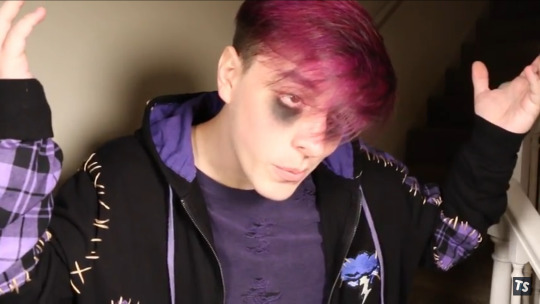
After that, Janus is the next side to appear. But we aren’t talking about his design- yet. Remember how at the start of this post, C!Thomas doesn’t have a unique style until later? This is when that comes into play. I’ll explain this in a reblog because I’ve hit the max for images.
#thomas sanders#sanders sides#janus sanders#virgil sanders#logan sanders#roman sanders#patton sanders#remus sanders#sanders sides analysis#ts sides
93 notes
·
View notes
Text
Are Logan & Janus Two Sides of the Same Coin?
In "Dealing With Intrusive Thoughts," it is revealed that Remus is Roman's "dark" counterpart. But who is Janus' "light" counterpart? It is certainly possible that he doesn't have one. But given how much emphasis is put into the symmetry between the "dark" & "light" sides (same number in each, black vs white clothing, etc), as well as the similarities within these groups (the naming conventions, for instance), it seems likely that Janus is somehow connected to one of the others. Following the example of Roman and Remus, both brothers are responsible for creativity, but Roman's creativity is deemed to be good and pure, whereas Remus' creativity is deemed dark and disturbing. Therefore, Janus and his counterpart would likely share the same fundamental trait as well, though their manifestations of it would be different. On this basis, I will argue that Logan and Janus are connected by the trait of reason, and that Janus is a "dark side" because he uses reason in a way that is cynical and self-interested.
First, let us compare Logan and Janus' style of argumentation. Logan typically references scientific studies and concepts, such as the Yerkes-Dodson Curve and the statistic about Christmas decorations that appears in "Putting Others First" to name only a few. This demonstrates his highly empirical world view, and from these empirical observations he draws normative conclusions about what Thomas ought to do. One of Logan's biggest emphases is on Thomas's health, as demonstrated in "Why Do We Get Out Of Bed In The Morning?"
On the other hand, Janus focuses on philosophical arguments, referencing Kant, Stirner, and Nietzsche to make his points. Though Janus is less interested in scientific facts, he still demonstrates logic in his own way, as these philosophers all used rational arguments to support their conclusions (note: whether or not you agree with them, what I mean by "rational" is that they applied the rules of logic to their premises to construct their philosophies). Janus has also been described as representing self-preservation, an aim not too dissimilar to Logan's goal of promoting Thomas' health. After all, Janus explicitly argued in favor of Thomas's mental health in "Putting Others First."
With all of this being said, it is worth noting that the flexibility and ambiguity of philosophy allows Janus to use logic as a tool to suit his needs in the moment. To put it in the words of Renee Descartes, "there is nothing so strange and little believable that it has not been said by one of the philosophers." Furthermore, "Selfishness vs Selflessness" draws attention to the contradictions between Stirner's belief in equality and his racism, suggesting that philosophers are often hypocritical and cannot necessarily be trusted. This is what makes Janus a "dark" side - he too has the capability to reason, but rather than pursuing the noble goal of truth, he uses his powers to manipulate others and further his own ends.
Given this reading, it is significant that in "Selfishness vs Selflessness," Logan is the one to mention Peter Singer, a contemporary philosopher. This further reinforces the hidden similarities between the two. Throughout the entire series, the only other side to use philosophical arguments is Janus, so for Logan to reference a philosopher in support of one of his own arguments suggests that he recognizes a certain logic to them as well (even if it is not his default method of logic). Moreover, Janus' adoption of the more science-based mental health rhetoric in the same episode shows that this parallel goes both ways.
This opens up a new avenue for speculation: who is Patton's "dark" counterpart? There are two possibilities: Virgil and the yet-to-be-revealed Orange Side. I will now discuss the evidence and implications of both:
Virgil: It is undeniable that Virgil and Patton share a unique bond. This can be seen throughout the episodes, and it would feed into the idea that Virgil is Patton's (formerly) "dark" counterpart. The trait that both share in common is feelings - while Patton's feelings are generally quite positive with some negative ones slipping through (see Moving on), Virgil is largely negative with a few positive emotions occasionally showing. However, if Virgil is the "dark" side of Patton, it is not clear what it means for him to have joined the "light" sides or what makes him special in that regard. Perhaps it can be explained as a result of Patton's morality -- he is ultimately who dictates which sides are good or bad, so if he took a personal liking to Virgil, he would see Virgil as good and thus Virgil would "become light."
Orange: Fans have speculated rather plausibly that the orange side will represent rage/anger, which would work well with this theory. This would be another instance of emotions "gone wrong" so to speak, as one emotion that Patton (and by extension Thomas) never seems to show is anger. Anger has a certain capacity for destructiveness, so this could be why the orange side is considered "dark." If orange was Patton's counterpart, this would leave Virgil without any counterpart, suggesting that he occupies an unusual role within Thomas' psyche and is perhaps the sole "neutral" side.
There is, of course, a third possibility: that orange & Virgil are counterparts, and that Patton is the one who is exceptional. Maybe Patton's role as the arbiter of morality means that he occupies a privileged position in Thomas's psyche which cannot easily be inverted (after all, what would be the purpose in a side that makes Thomas evil for no reason?)
Anyway, what do you guys think?
#sanders sides#sanders sides analysis#sanders sides theory#Sanders sides#logan sanders#janus sanders#ts sides#tss
13 notes
·
View notes
Text
And here's the last part of the analysis of the "The Sides Need a Nice Day" video, this time, let's talk about Janus and Remus.
(If you want to read the first part about Patton and Logan, go here.
If you want to read the second part about Virgil and Roman, go here.)
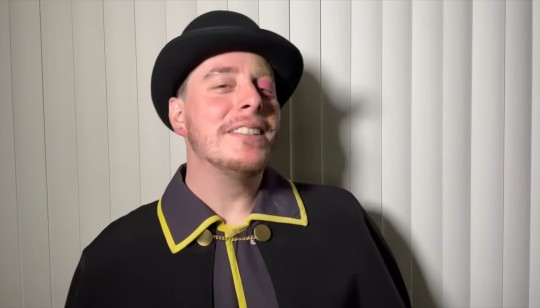
Right away, we have Janus letting us know he's about to one-up Patton and Virgil's attempts at cheering another side up, for whatever reason he feels compelled to do so (because acceptance isn't a competition or anything, right?), and says he will be giving Remus a nice day.
Specifically, he says that "freaks deserve nice days too" which is a funny but wonderful sentiment, because it shows that Janus sees Remus for what he is but also doesn't want him to change anything about that. Remus deserves to be who he is and enjoy himself, as they all do, which is kind of the whole point behind this video, even though it hasn't really been obvious up to this point, probably because Janus is being far more direct about it than the others were.
To explain, if you look back at Patton and Logan's part, you'll see that Patton wasn't trying to change anything about Logan and came up with things he would enjoy doing, but he wanted to do them far too quickly for Logan's liking.
And with Virgil and Roman, the suggestions all turned out to be things Virgil thought Roman would like but he changed those things to be something they might both enjoy instead, which wasn't really giving Roman anything he expected.
But Janus knows Remus very well, recognizes the purpose behind the trend is to simply give someone something they want and let them enjoy it, and he's prepared to properly do what the others had failed at, to give another side a nice day without flaw.
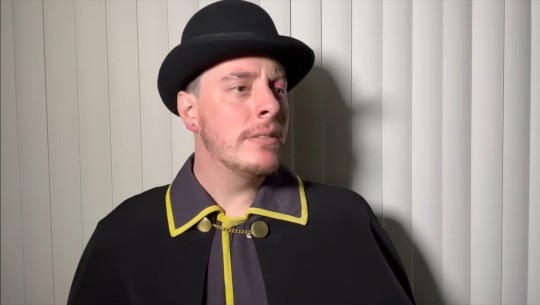
Also, Janus not knowing where the pens would be is likely meant as a little hint that Janus is still very unfamiliar with the light sides' area and where they'd keep things. Not sure how he knew where to find the note cards, though...
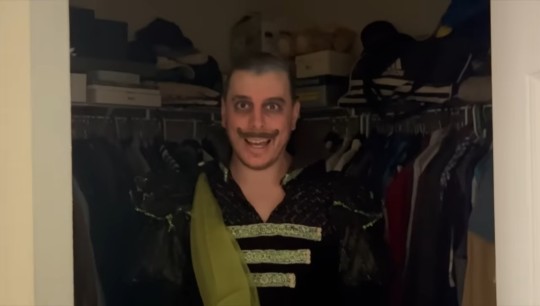
Janus goes looking for Remus in a dark closet, expecting him to be there but is still startled when it turns out he is.
He quickly gets to the point and simply tells Remus what to do and what the result will be. No constant questions back and forth, no push for an explanation, Janus just tells Remus what to expect immediately. See how easy that is?
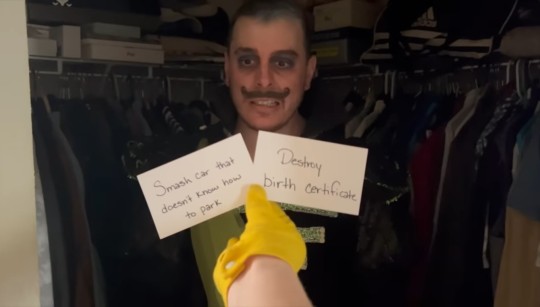
Remus doesn't seem too pleased before picking the card, but is delighted after he sees the result. This may imply Janus has offered to do things in the past that have not been enjoyable for Remus, but that could be a stretch. We don't know these two well enough yet to really be sure.
Janus, though with little emotion, tells Remus to 'have at it' and that he's convinced Thomas to 'lean into his intrusive thoughts' for the day. It's very likely that this means Thomas is merely thinking out these scenarios, not actually participating in them, which would still be enjoyable for Remus as someone who delves in the imagination just as much as Roman. It also would keep Thomas out of any real-life repercussions for these actions and keep down his stress and anxiety, as well.
Considering DwIT showed that just the thought alone would often put Thomas on edge, it makes sense that these actions are thoughts being leaned into and imagined rather than legitimately happening (and would also explain some of the unused options on the cards). Thomas has learned by now that thinking about something doesn't make you a bad person, and who better to convince him to have a little fun with that than Janus?

Remus excitedly grabs for the next option, instantly delighted by what it turns out to be. This really does show that Janus understands Remus rather well, he knows what Remus enjoys and doesn't have to change anything to make him happy. This comes from knowing each other, likely for a long time, and Janus not just knowing his interests but also understanding why Remus likes something.
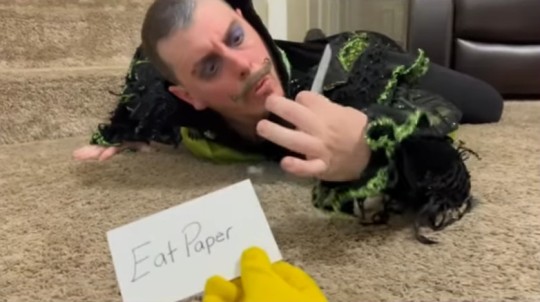
However, on the next round of options, Janus remarks that he can't believe he's doing this. He's either in disbelief that he's doing these nice things for Remus all to show up Patton and Virgil, or he is regretting how much effort he's put into this with how easily Remus is entertained by it.
Janus doesn't seem bored, but he's definitely doing this for Remus and not enjoying the activities alongside him.
As I mentioned in the last post about Virgil and Roman, this is likely in relation to love languages that have been on display throughout the whole video.
At this part with Janus and Remus, though, Janus is using his knowledge of Remus' interests to give him something he'll enjoy, making this the love language of 'gift-giving'. However, he's also acknowledging that these are activities others would be weirded-out by and then saying nothing negative about it. Janus is encouraging Remus to do these activities, regardless of what anyone will think, making this the love language of 'words of affirmation' in its own unique way, by validating what Remus enjoys.
While you could argue the others also did this, it means a lot more for Remus in particular, as someone whose entire presence is seen as a bad thing, that any ideas he may have are hazardous and awful, and he's shut down and ignored as much as possible at every turn. Something as simple as saying that it's actually fine if he wants to dangle a phone off the side of a bridge is incredibly kind to do for him.
But this also shows us that he's very used to being ignored and suppressed, because he was absolutely enamoured at the thought of getting to do any of these activities. From his reactions throughout this entire part, we know he would be equally as excited to eat paper as he would to summon Bloody Mary, which just proves that point. It's not just the extreme ideas of his that get pushed away, it's all of them. Remus finally getting the chance to act things out that he thinks up and enjoys must mean a hell of a lot to him.

Remus then thanks Janus in the end, a great big smile on his face, and Janus sighs and says "you're welcome. Don't say I never did anything for you."
It's possible this is just a little joke, but if it did mean something, it could be implying that Janus and Remus are not quite on equal ground in the current timeline of the plot. This would make sense, as Janus has just been accepted by Thomas, but only just. This still puts him leagues above where Remus is, even though Thomas does seem at least more used to him being around, at least.
This could cause a rift between Janus and Remus if it's not addressed soon, but Janus will still be working to earn his place amongst the others, so we'll have to see how that pans out.
It's also possible that Janus' line is more in reference to his overall purpose in the show. He operates more as Self-Preservation, but that doesn't have to be exclusive to Thomas, as many of the other sides can affect one another, as well. If he's attempting to restore some balance to Thomas' mental health by getting some of the other sides to understand their own biases (as he's been doing so far), this could still put Remus at a disadvantage until Remus is more accepted as Dark Creativity rather than Intrusive Thoughts. This may explain Janus' line if he's already been accused or expects to soon be accused of not paying enough attention to Remus, because Janus' priority will still have to be Thomas' well-being and that could put Remus at the bottom of his priorities.
He may not want Remus to change, but it's going to take a lot of work before the others can be ready to handle Remus without any changes, and he may know that a little too well, considering how long it's taken just for Janus to be accepted.
But, in the end, Janus did manage to prove his point in this part of the video, that he absolutely knows how to give another side a nice day, far better than Patton and Virgil, that's for sure.
He can be proud of that fact, for knowing Remus so well, but hopefully that isn't something he has to toss aside for Thomas' sake any time soon...
#sanders sides analysis#janus sanders#remus sanders#sanders sides#long post#ts spoilers#hella remus angst in here whoo#orbs thought bubbles
259 notes
·
View notes
Text
I don’t think I’ve seen Anyone talk about the fact that Logan’s infamous Orange outburst had a double meaning.
Pay attention to the frames that we see literally right before Logan yells ‘stop ignoring me!’
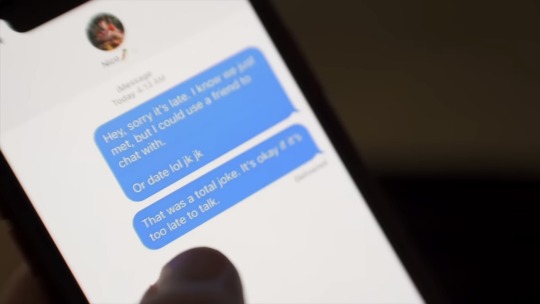
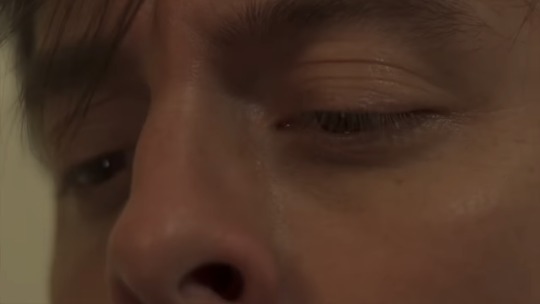

Thomas checks the messages he sent to Nico for the millionth time that day to find them still unanswered, and there’s a close up of his eyes narrowing.
‘Stop ignoring me’ wasn’t just something Logan was saying to Remus. It was something Thomas himself was thinking at that exact moment, about Nico. It’s why he jumps back in surprise when Nico immediately FaceTimes him (as if Nico somehow heard his thought and complied), and at that moment the orange fades from Logan’s eyes.
I think this means Remus’s line “Who do you really want to scream that at?” could also have a double meaning. The straightforward answer is that Logan wants to yell at Thomas to stop ignoring him. But there’s a second answer too— that the Orange side wanted to yell at Nico to stop ignoring him.
I’m a firm believer that Orange represents something akin to anger/rage/wrath, and this kinda just strengthens my theory. While Orange is obviously very intertwined with Logan’s feelings, he is of course still ultimately a representation of Thomas’s own state of mind. Right now, Thomas’s anger just seems to be manifesting through Logan for reasons yet unknown.
#and maybe its self indulgent to want an Anger side as a girlie who has recently had to come to terms w my anger issues#but hey I mean getting unreasonably mad at your friends not responding to your texts is hella relatable sue me for wanting an episode abt it#sanders sides#orange side#sanders asides#logan sanders#sanders sides analysis#working through intrusive thoughts
57 notes
·
View notes
Text
Logan in denial: analysis & season finale predictions
Or: why I think Logan is going to try (and fail) to deal with the Orange Side on his own.
I really loved this little hint towards Future Things in an otherwise fluffy episode. “Sometimes passion makes you act a little silly,” Patton says light-heartedly, but Logan might have made another Connection…
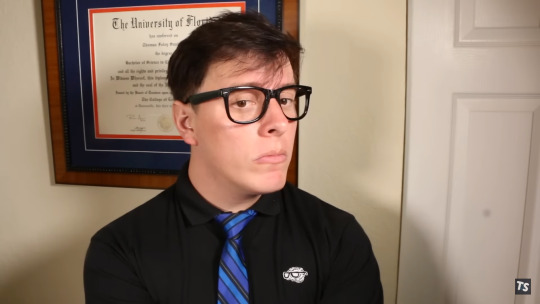
…and I think it’s about his strategy for how to suppress the Orange Side’s influence.
Firstly, let’s go back to the iconic “Stop ignoring me!” moment.
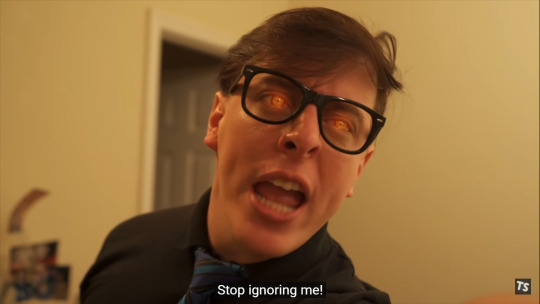
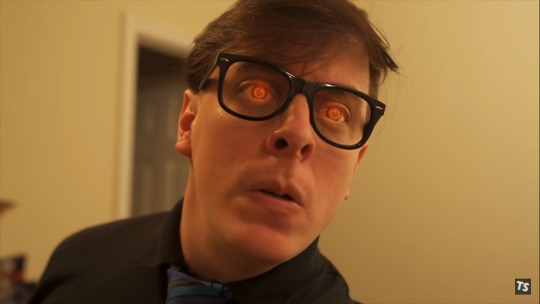
We can see that Logan’s own reaction almost immediately breaks through Orange’s amplification of his frustration, anger, bitterness etc: even before the orange eyes have faded away, Logan displays shock, fear, and remorse. So, Orange’s influence has (for now…) gone as quickly as it came; when Logan speaks to Thomas, the anger from a moment ago has evaporated, replaced instead with a subtle hurt. He’s non-confrontational, softly-spoken—as if hesitant to raise his voice too much after what has just happened.
This behaviour continues into the end card. While he still makes his irritation known when speaking to Roman, he does so in a much more reserved, subdued way than we’re used to. His body language is also closed-off; he mainly has his arms folded defensively. I think that’s a significant choice when we’ve just seen his perturbed realisation that he’s been pointing aggressively after, “Stop ignoring me!”
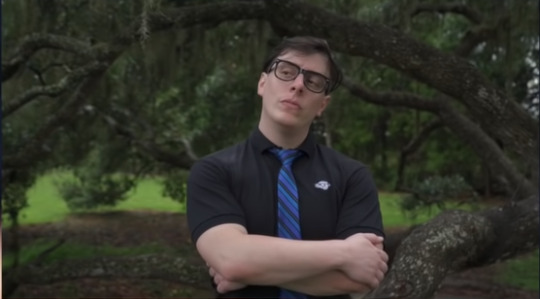

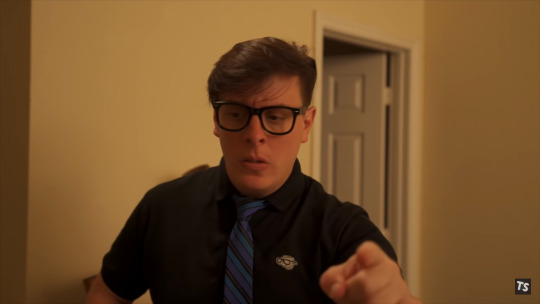
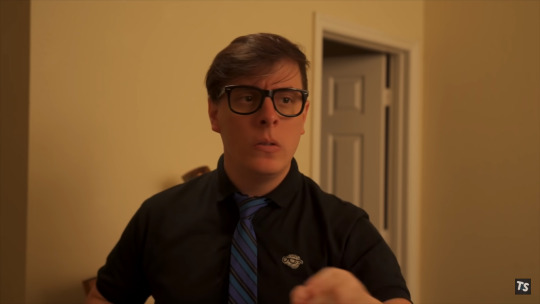
I think Logan is quietly mortified about his loss of control and is on guard to try and keep it from never happening again… so with that goal in mind, he avoids raising his voice, he keeps his arms and hands close to his body.
“If only Apollo had more influence today,” he murmurs—and while Roman interprets that as a reference to the Greek God, I think Logan is more referring to the psychological and philosophical definition, specifically the ability to ‘maintain emotional distance.’ (x) And just like, “Stop ignoring me!” has layers—it can refer to the Orange Side wanting to be recognised; Logan wanting to be listened to; and Thomas wanting a reply from Nico, all at the same time—so does Logan’s forlorn Apollo mention.
On the one hand, this concerns Thomas impulsively deciding to spend time with Nico, choosing to only act on what might make him feel emotionally better in the short-term, while also still feeding into his insecurities without addressing them.
On the other hand, Logan is also referring to his previous outburst—he, even while trying to perform his role as Logic, was unable to remain emotionally distant.
And this is why I think it’s important that the very first clear reveal of Logan’s ‘orange eyes’ happened in an ‘Asides’ episode—that scene specifically is a literal ‘aside’ between Logan and Remus. And apart from a pointed question about who Logan ‘really’ wants to scream, “Stop ignoring me!” at, Remus doesn’t really force Logan to confront the matter then and there—he leaves without escalating the situation, even though he’s spent the whole episode setting up chain reactions.
So, the ball is left in Logan’s court. And, as we’ve seen, instead of drawing any more attention to the outburst, Logan withdraws and keeps the troubling knowledge to himself.
Which brings me to denial.
I love the symbolism of Janus showing up right after the shot lingers on Logan (perhaps the camera’s following tree roots because neither Thomas or Logan are dealing with the ‘root’ of the problem? *bad dum tsh*). Janus biting into the apple before saying, “Everything is just fine,” sums up the conflict in his role: he has to be aware of the ‘forbidden knowledge’ in order to then deny its existence.
With regard to psychology, denial is the ‘refusal to acknowledge an unacceptable truth or emotion or to admit it into consciousness, used as a defence mechanism.’ (Oxford Dictionary of English). Sounds very much like the way in which Thomas has previously tried to ignore the existence of the Dark Sides.
And, again, denial is at work on more levels than one: Thomas is also defensive about the state of his apartment, which partly represents his emotional state (“It’s not that bad!”); Janus as self-preservation echoes Thomas lying to himself, and Logan… is also pretending that “everything is just fine.” His ‘unacceptable truth’ is that he is affected by emotions—even though he has experienced overwhelming evidence proving it to be so… which, right now, he is choosing to keep from the other sides.
Logan’s reaction to Patton’s joyful line about passion making you act ‘a little silly,’ briefly reveals, in my opinion, a subtext: what he thinks about his loss of control. He has linked his behaviour during the orange eyes scene to being ruled by emotions… and if he avoids ‘passion’—read as feelings entirely—he plans to never have such a thing happen again. The possible connection he’s made also suggests that he’s placed a value judgement on his reactions as well, dismissing them as ‘silly’, rather than something to be openly discussed.
When it comes to the other sides, specifically Patton, Roman and Virgil, the tension isn’t coming from whether or not Logan has feelings—they (and the audience) all know that he cares deeply, that he isn’t infallible, that he doesn’t represent logic and logic alone, with no capacity for any emotion. Instead, the tension is arising from what they don’t know, and what is being hidden from them. (For some related observations, see Thoughts on the tension in the end card (WTIT).)
Looking ahead, I think that compared to the suddenness of the scene in WTIT, there’ll be a slow build-up to another Logan with orange eyes reveal. Logan will be extremely wary about becoming emotionally involved. He’ll do his utmost to stay calm, to avoid adding any fuel to the ‘fire’, but I think that strategy in itself will be his downfall: by suppressing and trying to avoid another outburst, he will inevitably cause one. (I’m predicting eyes flickering between brown and orange before the dramatic climax, just before the others notice…)
Logan’s denial will result in him trying to conceal his own feelings and the Orange Side’s influence on him… but him trying to do so alone will bring about his failure. The only way this will be solved is when all parties are in the know—but I think they’ll only fully realise when the knowledge is brought out against Logan’s will.
Because if he ever brought up all of this himself, then he would have to break the illusion that denial gave him; to acknowledge the problem would mean needing to accept that it exists in the first place. He would have to admit to that he needs help, that he doesn’t have all the answers, that they will need to ask, ‘What happens when logic is compromised?’
He hasn’t done so—I think because he is deeply ashamed by the fact that that question may need to be answered.
#sanders sides#sanders sides theory#sanders sides meta#logan sanders#sanders sides analysis#sanders sides prediction#orange side#wtit#can plushies improve our health?
186 notes
·
View notes
Text
A Really Stupid Pet Peeve of Mine
One random thing that annoys me sometimes for some reason is when people refer to Patton solely as Thomas’ “moral side.” Like, when someone is introducing all the sides, they say the Logan is logic, Virgil is anxiety, Roman is creativity and passion, and Patton is morality.
The series may have recently been leaning into the moral aspect of Patton more, but he has previously been established to be a lot more broad than that. He preserves all of Thomas’ more nostalgic memories (as shown in Moving On Parts 1 & 2). He encourages Thomas to do the little things that make him happy (Mind vs. Heart and Growing Up show this especially well). He often says that he is Thomas’ emotions, or at least holds them.
Patton is fun and playful and sometimes ignores doing these more “ethics” centric duties in order to just enjoy life. In fact, most of the time, it seems like being Thomas’ moral compass is kind of a side gig rather than his main job.
His sense of morality is also shown to be both firm and loose at the same time. He has his core central values, and definitely has some of the more simplistic stuff down, but most of his more complex moral decisions are pretty in the moment and it feels like those more intense ones are more...shaky? If that’s the right word? His moral compass gets very confused and mixed up quite easily, and while that can happen to us all, it seems odd for a side whose whole thing is morality.
I was thinking about his almost contradictory nature a bit ago, as the title wasn’t adding up to me. How can he be Morality but also be the one in charge of the majority of Thomas’ emotions? That doesn’t make any sense. He seems more like just Thomas’ emotions who strongly affects his morals. So what does he have to do with morality? Then I remembered something that was right in front of my face: they don’t always refer to him as morality. Sometimes, they would call him Thomas’ “heart.”
And that makes so much more sense than him being morality specifically. Him being the heart explains everything about him and his actions. Metaphorically, we say that our feelings are stored in the heart, and that our heart is where some of our more instinctual morals are. The heart is often carefree and sometimes a bit fickle, often changing course in the moment.
It also explains why Patton’s moral dilemmas felt so weird to me. Because he isn’t morality specifically. He is more the instinctual and emotion driven side of morality. You could argue that ethics are always driven by emotion, but ethics also do sometimes have a sense of “logic” to them. Ethics are complicated, which is likely why Patton has such a hard time with his morality. It’s because it’s only a part of his job, and it isn’t his job alone.
So everything made sense. Patton isn’t Morality, he is Heart. He is Thomas’ sadness, happiness, fear, anger, surprise and disgust. He is the most simplistic and yet most complex side. His job is probably one of the hardest, in a way, as he carries many of the most all consuming and overwhelming emotions, like sadness and grief.
Now, there are other sides like Virgil and perhaps the Orange side (if people’s theories are correct) who are in charge of certain emotions. But Patton is in charge of the basic ones specifically. Thomas has a fear of spiders, and therefore Patton has a fear of spiders, whereas Virgil doesn’t. If we are going with the theory that Orange is something like Wrath or Rage, that is still slightly different from anger. And we rarely associate anger with the heart either way, unless it is very deeply rooted. On top of this, Rage and Wrath are much more festering, something that doesn’t seem to fit with what Patton is about.
All in all, this is my probably completely pointless post about why Patton is Thomas’ Heart, not his Morality. This is a really dumb thing to get annoyed over, but I just needed to let it out. It can lead to so many misconceptions about him as a character if we go with the mindset that his entire title is Morality rather than Thomas’ Heart. I’m pretty sure that everyone will read this post and say “well yeah, duh, we already know that. Way to state the obvious and get worked up over nothing.” But in my defense, I am neurodivergent and particular about everything.
So yeah, those are my thoughts on that.
#sanders sides#thomas sanders sides#thomas sanders#patton sanders#sanders sides patton#patton sanders sides#tss#tss patton#the sides#morality sanders#he should be heart sanders in my humble opinion#i'm particular#i'm picky#why am i like this#i am annoying#pet peeve#dumb pet peeve#i am dumb#sanders sides analysis#tss analysis#character study#character analysis#things that annoy me
32 notes
·
View notes
Text
also i just wanna point out in the “losing my motivation” video where logan plays dress up, when roman comes logan says “i think there’s a spider behind you— nevermind it was just a shadow” and roman looks behind the tv.
like i know it’s small shit like that but oh my god that’s cool like shadows can represent the opposites of ourselves (i mean look at wisp and gigi from 13 wishes)
and also in wtit when remus is pouting and ignoring logan in his chair there’s an ORANGE JACKET RIGHT BEHIND HIM.
#sanders sides#logan sanders#thomas sanders#remus sanders#roman sanders#ts orange#dark creativity sanders#logic sanders#creativity sanders#sanders sides theory#sanders sides analysis#tss#mitzy analyzes
41 notes
·
View notes
Text
it’s the fact that roman’s been so underestimated constantly by the others, patronized to, called stupid, treated like a baby or a bratty child, to the point where he UNDERESTIMATES HIMSELF.
it’s so clear as the series progresses how little roman starts to think of himself. he’s less sure of himself when he speaks. he’s less grounded in his own values, opting to just take the side of whoever guilt trips him more in order to avoid more ridicule.
it’s really sad that one of the most spectacular things about roman’s character, his blooming confidence, is dwindling and crumbling at an alarming rate.
i hope thomas addresses this in the series at some point because i can’t imagine it would be good for him if his creativity and SENSE OF EGO loses all confidence and sureness in himself, because apparently, he’s too dumb, a stupid prince, a kiddo who needs to be reformed.
it’s fucked up.
#sanders sides#thomas sanders#tss#roman sanders#sanders sides fandom#roman sanders angst#roman sanders deserves better#ts roman#roman ts#roman tss#sanders sides analysis#prodigal tss
36 notes
·
View notes